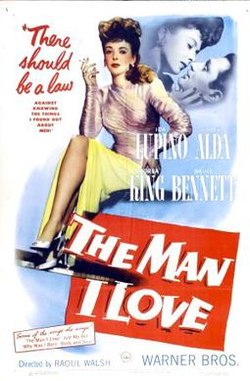 It feels like we might have the courtesy of a bit of Gershwin masquerading under the cloak of noir. We find ourselves at a hole-in-the-wall jazz joint after hours. Club 39 feels free and easy with an intimate jam sesh. Petey Brown (Ida Lupino) is having fun with a rendition of “The Man I Love.”
It feels like we might have the courtesy of a bit of Gershwin masquerading under the cloak of noir. We find ourselves at a hole-in-the-wall jazz joint after hours. Club 39 feels free and easy with an intimate jam sesh. Petey Brown (Ida Lupino) is having fun with a rendition of “The Man I Love.”
What strikes us is her breezy confidence. Everyone seems to like her, and she knows how to get by on her own laurels. So though we might begin on a New York street corner, this is all merely the set-up supplying not simply a preexisting world but the core tenets of our main character. We come to like her right from the outset.
However, quickly our action is transplanted to Long Beach, California because catching a bit of the homesickness bug, Petey goes to call on her two younger sisters and brother for the holidays. Could it be she brings darkness into sunshiny suburbia? Again, that would be a negative.
Instead, she comes back into her family’s lives to play the role of big sister and Ms. Fix-it, leaving their lives better than when she arrived. The eldest sister, Sally slings spaghetti for a living, and she’s angelic. But one Nicky Toresca (Robert Alda) has his eyes on her because his uncle runs the restaurant. He’s a real cad (On a side note: I will always have gratitude for Alda for bringing his son Alan into the world to star in M*A*S*H).
Admittedly, his sleazy charisma is pretty smooth, but it turns ugly on a dime. This isn’t just a dismissible instance of being “fresh;” it’s blatant, out-in-the-open harassment, and it grieves me to see. Because from everything we have been coming to terms with in the world, it is all but the norm. I am reminded of Janis Paige’s article bravely recounting her own real-life experience.
A movie like this can easily turn everything into an instance for melodrama, and we cannot blame it too much because it is meant to be riveting. Regardless, this is a film full to the gills with angry men. Sally’s own husband, a war hero, is under observation at the hospital for certain volatile instabilities. The girls’ younger brother Joey pushes back against the chiding of his siblings as he gets more involved running errands for Torresca.
Across the hall, a generally affable Johnny O’Connor is jealous over his glamorous wife (Dolores Moran), who finds her twin sons and a middling marriage to be a bore. Ida Lupino is the one who can capably joust with them all, because, of course, she’s from New York. She’s been around and partially to shield her sister, she takes up a job as a lounge singer at Toresca’s club. He’s got his paws and lecherous eyes all over her.
Even she falls for a man, a tragic and equally tormented pianist San Thomas (Bruce Bennet) with demons of his own to exorcise. So amid this constant collision of temperaments and personalities, there’s bound to be a firestorm of emotion, ultimately blowing up in a need for release.
Raoul Walsh is an old pro at manning stories even if this one feels slightly out of his typical wheelhouse. However, The Man I Love is blessed with a wide-ranging, truly eclectic cast. In fact, for the amount of time it has to work with, it’s genuinely surprising how many characters it chooses to erect.
Admittedly, despite the diverse spread, they could have used more shading on a whole. Martha Vickers, in particular, feels like a bit of a letdown, because her part is so tepid as the youngest sister who would rather stay home than go out with boys. Especially in juxtaposition with her scene-stealing turn in The Big Sleep, it seems like a monumental waste. Alan Hale also gets a lackluster part to fill.
So while not everyone is exactly electric (all but Lupino are fairly drab), the sheer variety of talent makes for some intriguing dynamics to go with all the genre pieces. I’m tempted to consider it a woman’s picture — more melodrama than noir — but why split threads? Infused with jazz and romance and even a bit of holiday cheer, there are some agreeable facets to the ambiance being created.
When the time comes, Petey drifts out of her family’s life and heads back out into the great big world ready to come back when she’s needed again. Wouldn’t we all like a person like that in our lives? But then real life doesn’t work quite like that. Messes are not remedied so easily. Oftentimes the pain and suffering have lifelong consequences that cannot be conveniently tied together by a Hollywood ending.
3/5 Stars
